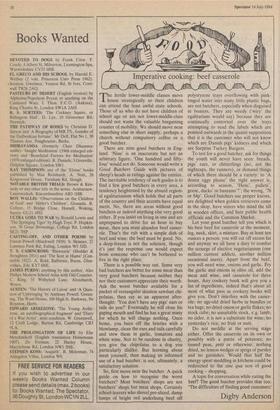**111,1110/1
Imperative cooking: beef casserole
The fertile lower-middle classes move house strategically so their children can attend the least awful state schools. Those of us who do not have children of school age or are not lower-middle-class should not waste the valuable bargaining counter of mobility. We should move near something else in short supply, perhaps a church without compulsory coffee or a good butcher.
There are nine good butchers in Eng- land. 'Nine' is an inaccurate but not an arbitrary figure. 'One hundred and fifty- four' would not do. Someone would write a Good Butchers Guide with pictures of sheep's heads as ratings against the entries. The inevitable tendency of such guides is to find a few good butchers in every area, a tendency heightened by the absurd region- al egalitarianism which holds that all parts of the country and their accents have equal merit. No, there are areas without good butchers or indeed anything else very good either. If you insist on living in one and are unprepared to drive for an hour to buy meat, then you must abandon beef casser- ole. That's the rub with a simple dish of beef and wine: the beef must be good. No, a deep-freeze is not the solution, though it's just the response one would expect from someone who can't be bothered to live in the right place.
There is a possible way out. Some very bad butchers are better for some meat than very good butchers because neither they nor their customers appreciate their worth. Ask the worst butcher available for a packet of rectangular skinless sawdust chi- polatas, then say as an apparent after- thought: 'You don't have any pigs' ears or tails do you?' Eventually he will close his gaping mouth and find he has a great many for which he will charge nothing. Once home, you burn off the bristles with a blowlamp, clean the ears and tails carefully and stew them in garlic, tomatoes and white wine. Not to be outdone in charity, you give the chipolatas to a dog you particularly dislike. But learning about meat yourself, then making an informed use of a bad butcher, is not, ultimately, a satisfactory solution.
So, first move near the butcher. A quick guide on how to recognise the worst butchers? Most butchers' shops are not butchers' shops but meat shops. Certainly school-leavers who shovel pre-sliced, damp lumps of bright red underhung beef off polystyrene trays overflowing with pink- tinged water into nasty little plastic bags, are not butchers, especially when disguised in boaters. They are weedy ('wiry' the egalitarians would say) because they are continually contorted over the trays attempting to read the labels which are pointed outwards in the quaint supposition that it is the customer who will not know which are Danish pigs' kidneys and which are Surprise Turkey Burgers.
To test for a good butcher, ask for things the youth will never have seen: breads, pigs' ears, or chitterlings (no, not the nightcaps, the runners), or demand things of which there should be a variety: to 'A dozen eggs please' the right answer is, according to season, 'Hens', pullets', geese, ducks' or bantams'?'; the wrong, '78 or 84p'. Good butchers use proper knives, are delighted when golden retrievers come in the shop, have sisters who mind the till in wooden offices, and hate public health officials and the Common Market.
Let your good butcher tell you which is his best beef for casserole at the moment, leg, neck, skirt, a mixture. Buy at least ten ounces a person: you will cut off excess fat and anyway we all have a duty to combat the scourge of elective vegetarianism (one million current addicts, another million occasional users). Apart from the beef, you will need wine, onions and garlic. Fry the garlic and onions in olive oil, add the meat and wine, and casserole for three hours. Any cookery book will give you a list of ingredients, indeed that's about all most of what pass as cookery books will give you. Don't interfere with the casser- ole: no age-old dried herbs in bundles or tea bags; no dried onion or garlic flakes; no stock cube; no unsuitable stock, e.g. lamb; no cider, it is not a substitute for wine; no yesterday's rice; no fruit or nuts.
Do not meddle at the serving stage either. Offer the casserole on its own or possibly with a purée of potatoes; no tinned peas, petit or otherwise, nothing dried, no lemon wedges or sprigs of parsley and no garnishes. Would that half the energy spent meddling in kitchens could be redirected to the sine qua non of good cooking — shopping.
A topic for conversation while eating the beef? The good butcher provides that too: `The difficulties of finding good customers:
Digby Anderson














































 Previous page
Previous page